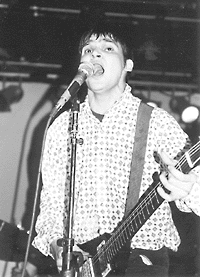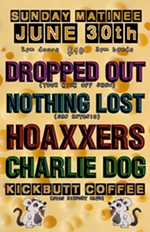Live Shots
Fri., Jan. 30, 1998
|
|
Emo's, January 16
Austin old school. And for The Jesus Lizard, a line reaching down the block to the Blue Flamingo (old school closed). Most were still out there when the Chicago-based quartet entered through the side door of the club's downstairs stage, the only refuge in an ocean of people. A cheer went up, the room bracing for the assault about to begin and the musicians looking casually menacing. "Hi," said David Yow. "We're Poi Dog Pondering." And so it began, hard, David Wm. Sims' basslines clenching like muscle spasms - painful, pulsing, straining. So hard. Hit it again, you bastard. And Duane Denison's angular guitar riffs, grinding across basslines while some new drummer pounds away. And Yow, looking like his usual serial killer self, hair quickly soaked and shirt gone. Screaming like a maniac. "Lies, placidyls, set up a camera to record your own death," comes into focus at one point, "Blue Shot" from the band's Shot. That's Yow, some criminally insane sociopath stalking the audience, leaping into it at every turn. It's his form of assault, yet the crowd catches him with loving arms, Yow twisting and writhing while the mike cord curls around him like a vine. No sooner is he spit back up on stage than he leaps off it again. The band, meanwhile, keeps hammering away, Dennison's slide guitar on "Thumbscrews" coming off like the Devil wielding an industrial table saw. "This one's for Glen Taylor," says Yow, remembering the Dicks' bassist (old school deceased) midway through the band's 45-minute main set. The pace slows for three minutes - a virtual ballad. "Thanks to Starfish and Thighmaster, goodnight" says Yow the blink of an eye later. No! Don't stop, please. Come back. They do, playing another 45-minute set - plugging the need, filling the hole. Midway through, Yow snarls and gives the audience the finger - a scowl to go along with it. In response, off towards the back entrance, someone touches index finger to thumb and gives Yow the "A-Okay" sign. Yow sees it, stops, gives a dreamy smile, and leaps off the stage. Swimming towards the door, Yow's feet finally hit pavement and he finds himself in the arms of Brett Bradford, guitarist for Sangre de Toro. Along with Yow, Sims, and drummer Rey Washam, Bradford was Scratch Acid (old school best). Grinning and hugging like Christmas morning, Bradford, Yow, and Billy Pringle enjoy a moment. Fifteen years ago, this moment was probably enjoyed at the Cave Club. Old school. The Greatest Gift. - Raoul Hernandez
SCOTLAND THE BRAVE
Frank Erwin Center, January 19
It's been a long time since I attended a concert that opened with "The Star Spangled Banner," but as four dozen members of The Regimental Band of the Scots Guards marched into the Erwin Center arena, I stood up with the audience for our country's anthem and "God Save the Queen." It was Scotland the Brave, a touring show featuring the Scots Guards and the Pipes & Drums of the Black Watch, not the sort of concert I usually attend. No one in the audience tried to sneak a cigarette and there was enough tartan visible in the seats to outfit yet another Jacobite uprising. It wasn't until the dark kilts of the Pipes & Drums of the Black Watch swirled across the arena floor amid "The Balmoral Highlanders," however, that a palpable surge of patriotism rose with the applause. A marching band such as this is like a glorious assault of the senses: eyes on the precision steps, admiring the audaciously colored costumes, letting the strathspeys, airs, reels, jigs, ballads, and marches float across the beatific faces of the audience like a mountain breeze coming down over the loch. To be sure, there were the expected tunes: "Scotland the Brave," "Scots Whae Hae," "Roamin' in the Gloamin'," "Comin' Through the Rye"; and there were the crowd-pleasers I could have done without: "New York, New York," "The Battle Hymn of the Republic," and "Dixie" (which was interesting if only to see part of the audience standing and other part remain sitting). There were also rousing Sousa marches - music so exhilarating it defies description - and a tribute to Scot poet Robert Burns, in which I stole a peek at a grey-haired couple on the first row kissing during "My Love Is Like a Red Red Rose," and a group of young dancers who gamely did the Highland Fling. When a lone piper stood for "Sleep, Dearie, Sleep" the wistful lonesome sound of pipes drifted past, lingering with me long after the show was over. As I walked to my car, I closed my eyes and breathed deeply the scent of heather and peat as carried on the cool January night wind in Texas. - Margaret Moser
EMPIRE OF SHIT
Bates Motel, January 21
Well, you certainly can't blame 'em for trying. See, apparently today's more sophisticated music audiences find punk rock so boring now that it takes naked chicks, fire, and a bunch of smashing shit up to grab people's attention and hold it for more than five seconds. Personally, I found Gerry from the Bulemics' indiscreet beer bottle-wielding during a performance earlier in the evening over at the Flamingo Cantina a lot more potentially threatening, and needless to say, Austin's Bulemics are a hell of a lot more enjoyable of a band. That aside, whatever common thread one might discern as connecting bands like the Butthole Surfers and the Dwarves to more "performance-oriented" groups such as Missing Foundation or Crash Worship is exactly what Empire of Shit are tenuously trying to cling to conceptually, and truthfully, you can't fault them too terribly much for that. Sure you've seen it all before, but that crusty punk wearing a diaper over there doesn't know shit (no pun intended) about what crazy antics Gibby, GG, or the rest of that lot have been pulling for the last 15 years, so maybe it really is all new to them. Something vital definitely gets lost in the translation, though, particularly when you see all the bemused observers (sheep) rallying around such well-worn and nowhere-near spontaneous displays of "anarchy" like 10-year-olds at the new Spice Girls movie. Even 10-year-olds, however, would probably have the good sense to know how fake the whole thing is. What's the difference? Fuck if I know. This onetime Portland band (who have apparently relocated here) are obviously serious about what they're doing, and while I can't say whether such professionalism speaks more to what a put-on the whole thing is, or whether it's all a moot point to begin with, I can say that as the nauseating stench of sulfur from dimestore smoke bombs filled the room and the lighter fluid began to flow more freely than the beer, I found myself asking the age-old, perennial question, "Who even gives a shit?" - Chuck Trend
SHARECROPPERS
Stubb's, January 22
They were the Sharecroppers, then they became the Good Medicine Band. They released a CD under that name, then promptly reclaimed the Sharecropper moniker. One thing has not changed, though: These local boys do not take their country lightly. In fact, they don't seem to take anything lightly, which is a problem. The untempered severity of their show turns from emotional playing to melodrama quicker than they can switch instruments - something they do a lot. They trade off between three front men, all of whom lend a different air to the performance, none of which leave any lasting mark. Musically, the band reaches for a bunch of styles, grabbing at you with power ballads, dour outlaw country, and the drawn-out noodling of blues jams, but what they're really selling is drama - strained lyrical intensity setting the stage for some overblown choruses and a lot of soloing on mandolin, guitar, and banjo. Their shows are not without their moments, however. Bassist Jim Palmer came through with some even-keeled pop songs, while guitarist Nathan Hamilton's "I'm gonna light a fire" provided a few highlights - as did the occasional stripped-down banjo jamming. And in everyone present, the Sharecroppers inspired movement, a constant and seemingly uncontrollable flurry of dancing and fluttering, itself a testimony to the band's occasional gut-appeal. While the band milks the tough-ass angle, they aren't above penning or playing a song about wildflowers in spring, which is evidence of their leanings toward being a straight-up hippie jam band. The signs are there: bandanas everywhere, the tendency to make songs much longer than they need to be, the extra percussion player, and the unmistakable indicator: a perfunctory drum-jam at the end of the show. Suddenly congas and maracas were everywhere, and Steve Earle had truly left the building. The bottom line is that the Sharecroppers don't really hit on any singular style well or long enough for it to be convincing. In trying to be all things to all people, they're spreading themselves a bit too thin. - Christopher Hess
GOVINDA
The Mercury Lounge, January 24
Opening band Dezadasi instilled an organic vibe in the burgeoning crowd with a sparse yet pulsing resonance, supplied by flute and hand drums and enhanced by a castanet-wielding
belly dancer. If this trio was a grooving chamber ensemble, then the seven members of Austin's Govinda were the symphonic equivalent, featuring a drum kit, violin, djembe drums, electric bass, digerdoo and digerdoo treatment effects, assorted hand drums, electric guitar, hammer dulcimer, synth, in-line flute, and sundry percussion. And the singing wasn't singing in the traditional sense: echo/reverbed voices were used more as textural instruments than vehicles for lyric delivery. A problem with such a full stage, however, is hearing all the instruments clearly. Luckily for Govinda, and with occasional exceptions (the hammer dulcimer's flowing notes were submerged in the thick mix), the sound engineer was able to emancipate the band's many timbres into every nook and cranny of the shoebox-shaped, nearly full club. In performance, the band easily hybridized musical styles as diverse as jazz, trip-hop, amped up Gypsy parlor music, and funk. During the evening's two sets, songs off of the local band's two CDs served as a point of departure for alternative arrangements, new mood exploration, and improvisation. At its worst, this lead to talented meandering. At best, Govinda was able to mix the space-dub-hop-rock-out sensation of studio specialists Material with the hyperlive ethereal rhythms of Dead Can Dance and Groove Collective's two-chord wily meltdowns. If the vocal and physical response of would be-gothic-Guineveres and hirsute Harrys was any indication, the result was successful. Perhaps credit goes to the band's modest focal point, the violinist (quite possibly the love child of Indian virtuoso L. Shankar and Western classical bad boy Nigel Kennedy), who, like a painter, added texture to melody lines with broad bow strokes, wah-wah effects, and pizzicato string plucking. Govinda's truly original music may be hard-to-describe, but it's easy to dig. Hell, it was able to turn The Mercury Lounge into an oasis of live music on the desert that can be Sixth Street on a Saturday night. - David Lynch







